#cook:はくさい
Explore tagged Tumblr posts
Photo

✿ 白菜たっぷりちゃんぽん風パスタ ✍️ 豆乳+スキムミルク,白ワイン
#cook:パスタ#cook:ちゃんぽん#cook鶏がら×:味噌#cook:鶏がら×にんにく×味噌#cook:はくさい#cook:シーフードミックス#cook:ブロッコリー#cook:めん#cook:主食#cook:パスタ:和風#cook:スキムミルク×豆乳#cook:豆乳#cook:牛乳#2020〜#cook:2020〜#cook:主食:はくさい#cook:主食:野菜#cook
0 notes
Text

家主があさから なっとうまきを作ってるですので
オレはくろいパリパリを わけわけしてもらうです
My landlady cook? Natto-maki this morning, so I enjoy nori that she shared
8K notes
·
View notes
Text
YouTube Channels for Kids by JLPT Levels
(。•̀ᴗ-)✧ resources

こんにちは, Japanese learners! Learning a language is an exciting adventure, isn't it? To add a spark of joy to your Japanese learning journey, here's a collection of YouTube channels tailored for kids. Organized by JLPT levels, these channels offer a blend of education and entertainment for learners at different stages. Keep in mind, though, that JLPT levels aren't an exact science like math – language learning can be subjective in terms of difficulty. However, these resources provide a fantastic starting point and a fun way to explore the world of Japanese language and culture. Let's hop into this delightful world of animated learning and playful discoveries!
Friendly reminder to adjust your way of learning in order to make the most of what you're studying to reach the goal you truly want! read my post about it (ᵔ◡ᵔ)
꒰ა ˚₊ ✧・┈・╴N 5 ╴・┈・𐑺 ‧₊˚໒꒱
— Curious George (N5 level)
— Japanese folk tales/anime series (Japanese audio/Japanese subtitles) from BomBom Academy (N5 level)
— Peppa Pig (N5-4 level)
— Anpanman (N5-4 level)
— NHK education (N5-4 level)
꒰ა ˚₊ ✧・┈・╴N4 ╴・┈・𐑺 ‧₊˚໒꒱
— Cinnamon Roll, Sanrio (N4 level)
— [Anime] Atashin'chi (N4-3 level)
꒰ა ˚₊ ✧・┈・╴N3 ╴・┈・𐑺 ‧₊˚໒꒱
— Sesame Street Japan (N3 level)
— Chibi Maruko Chan (N3-2 level)
꒰ა ˚₊ ✧・┈・╴N2 ╴・┈・𐑺 ‧₊˚໒꒱
— Precure (N2 level)
またね~@inkichan
꒰ა ˚₊ ✧・┈・╴﹕꒰ ᐢ。- ༝ -。ᐢ ꒱﹕╴・┈・𐑺 ‧₊˚໒꒱
#japanese#nihongo#studyblr#learn Japanese#learning Japanese#japanese langblr#langblog#japanese studyblr#日本語#study japanese#japanese resources#free resources#resources#japanese free resources#youtube#JLPT#JLPT N5
762 notes
·
View notes
Text
Differences in localization and the original pt. 1
I am starting a series of posts with the goal of familiarizing players with some of the differences that localization creates for us in contrast to the original.
Some moments are radically different, misleading and causing controversy, while some do not change the essence of what is happening, but are still noticeably different
Disclaimer: these posts will be written solely for the purpose of familiarization; I do not force anyone to play the game in Japanese, because you are free to choose the version of the game that is comfortable for you. I just noticed some moments and want to share them with you.
The localization of Gyakuten Saiban (Ace Attorney) is essentially good, but there are some moments, IMHO, that I personally would not adapt or change in any way
One of the most serious changes, which, in my opinion, should not have been touched at all, is Mitsurugi's (Edgeworth) phobias.
As if case 1-4 never happened.
In the Japanese version, when examining the files in Mitsurugi's office, Naruhodō will be perplexed about the need for such high shelves - they could collapse during an earthquake.
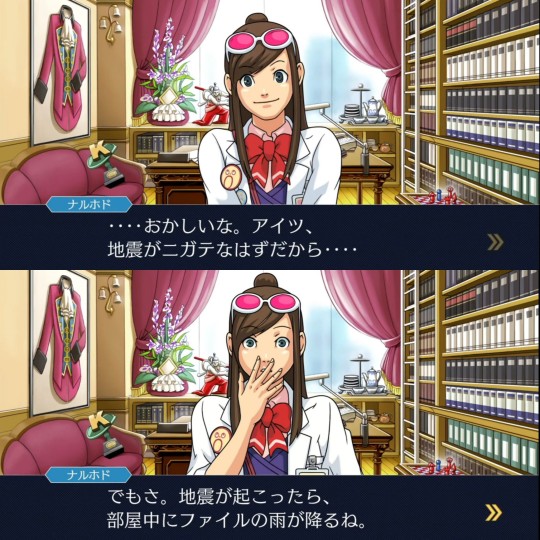
・・・・おかしいな。アイツ、 地震がニガテなはずだから……
Okashī na. Aitsu, jishin ga nigatena hazudakara……
...That's strange. He's supposed to be bad with earthquakes...
でもさ。地震が起こったら、 部屋中にファイルの雨が降るね。
demo sa. Jishin ga okottara, heya-chū ni fairu no amegafuru ne.
But if an earthquake happens, files will rain down all over the room.
In the localization (for some reason) at this point Mitsurugi was given a fear of heights. For what reason... I don't understand
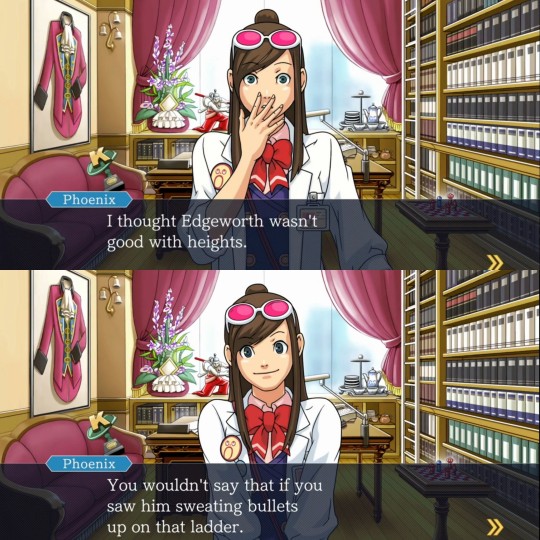
___________________________________________
Next, another big difference is Naruhodo's food preferences
In the Japanese version, Tomi the clown offers him miso ramen (which is cooked in chicken broth and miso), which Naruhodo refuses and says that he prefers tonkotsu ramen (cooked in pork broth and boiled pork is added to it).
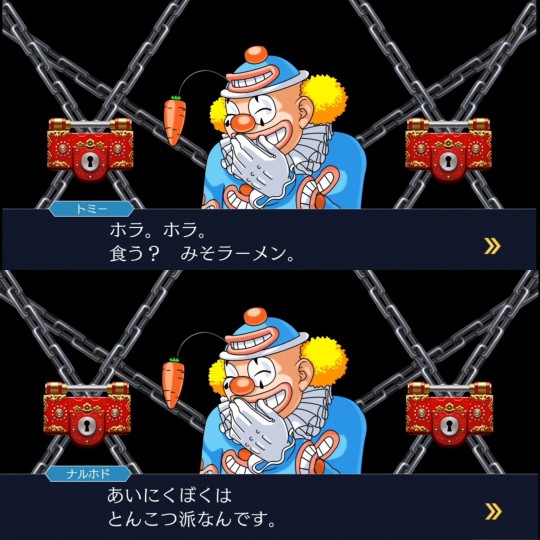
ホラ。ホラ。 食う? みそラーメン。
hora. hora. Kuu? Miso rāmen.
Look. Look. Want some miso ramen?
あいにくぼくは とんこつ派なんです。
ainiku boku wa tonkotsu-hana ndesu.
Unfortunately, I prefer tonkotsu (ramen).
That is, Naruhodo literally says that he would prefer pork, not chicken.
What about the localization? It's the other way around.
The clown offers him a burger (the patties for which are usually made from beef and pork), but he says that he would rather choose a chicken sandwich.
Why?
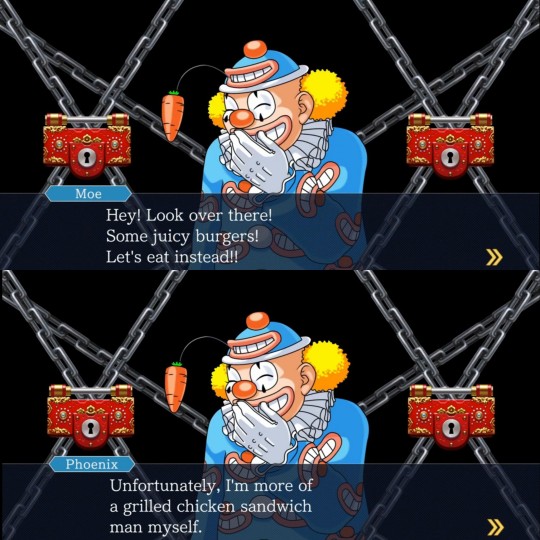
___________________________________________
Vending machine in 1-3
I have no complaints about its contents (it is adapted), but here another preference of Naruhodo is lost
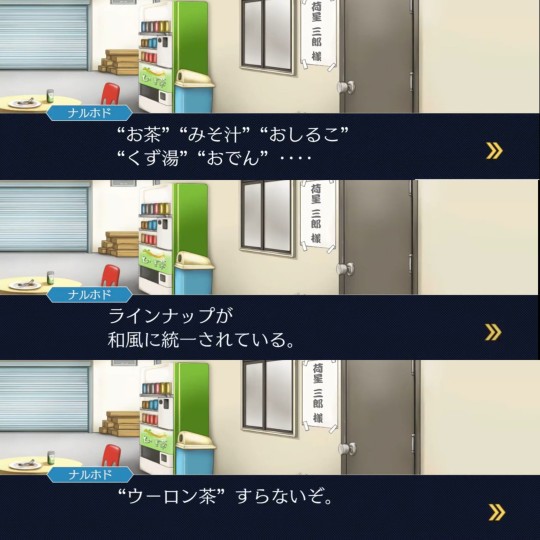
“お茶”“みそ汁”“おしるこ” “くず湯”“おでん”・・・・
“ocha” “misoshiru” “o shiruko” “kuzu yu” “oden”
"Tea" "Miso soup" "Oshiruko" "Kudzu soup" "Oden" ...
ラインナップが 和風に統一されている。
rain'nappu ga wafū ni tōitsu sa rete iru.
The lineup is unified in Japanese style.
“ウーロン茶”すらないぞ。
“ūron cha” sura nai zo.
There's not even "oolong tea."
In the Japanese version, reading the menu of the vending machine, Naruhodo annoyedly comments that "there is not even oolong tea". He literally names the tea he likes!
In the localization, he is disappointed that the food in the vending machine is too... ordinary, and he was expecting something that is not usually sold there (popcorn).
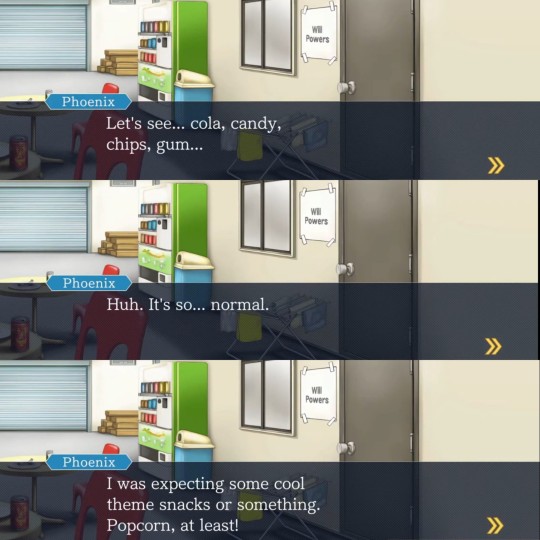
___________________________________________
Naruhodō University
Case 3-1 is very rich in information about the young Naruhodō, including the name of the university he attended
In the Japanese version, it is Yumei University (the same university where his ancestor Ryunosuke Naruhodō studied during the Meiji era - then it was called Yumei Imperial University), which creates an important reference to Dai Gyakuten Saiban (The Great Ace Attorney)
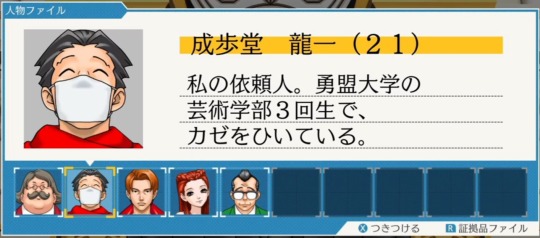
私の依頼人。勇盟大学の 芸術学部3回生で、 カゼをひいている。
watashi no iraijin. Yūmei daigaku no geijutsu gakubu 3-kaisei de, kaze o hīte iru.
My client. A third-year student in the art department at Yumei University, suffering from a cold.
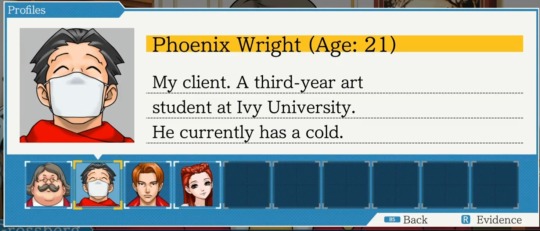
In the localization, he studies at Ivy University, as if referring to the famous Ivy League (elite universities).
A very good decision that shows Naruhodō's abilities and the high quality of his education (my clever boy)
___________________________________________
Interesting addition
And the last one for today, a conversation with Mask in the detention center
When Yusaku (Ron) tells the story of the allegedly lost vase, Naruhodō makes a comment about the absurdity of his story
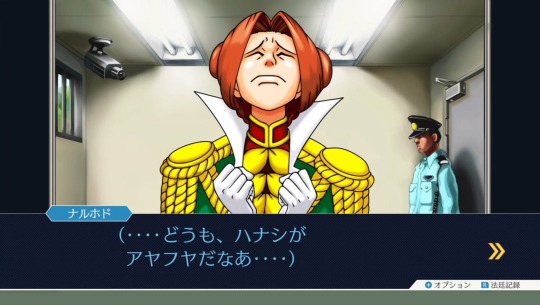
(・・・・どうも、ハナシが アヤフヤだなあ・・・)(dōmo, hanashi ga ayafuya da nā)
(... I guess the story is a bit vague...)
The localization decided to make a reference to Naruhodō's education in the field of art, and he compares Mask's story to the surreal paintings of Dali.
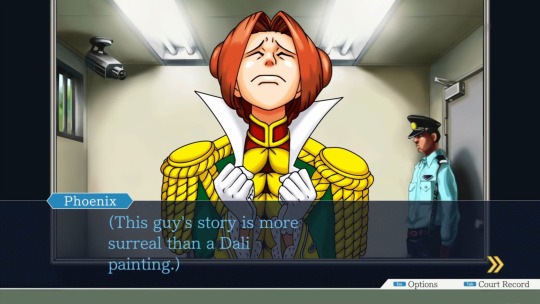
A nice addition, but still different from the original version.
___________________________________________
In total, in my opinion, 3 unsuccessful changes out of 5.
If you also noticed any differences - feel free to tell us about them. Let's educate ourselves together.
It will be a bit more difficult with the subsequent parts, because I can't buy the Japanese version of TGAA (it is only available to a certain list of countries), and I don't have the new Apollo trilogy and the Investigations duology to check every little thing (and I don't have an extra $80), and those who record the walkthrough do not always check every clue, where the contradictions lie.
159 notes
·
View notes
Text
沖縄県の那覇市公設���場。沖縄で食される魚介類や肉類が売られています。1階で購入して2階で調理してもらうこともできるようです。貝好きにはたまらない、新鮮な栄螺(さざえ)。写真は無料でダウンロードできるようにしていますので自由に利用してください。
"Naha City Public Market in Okinawa. It sells seafood and meats commonly consumed in Okinawa. You can purchase items on the first floor and have them cooked on the second floor. For shellfish lovers, the fresh turban shells (sazae) are a delight. The photos are available for free download, so feel free to use them."
57 notes
·
View notes
Text
Japanese "Onomatopoeia" 『オノマトペ/Onomatope)』
There are two types in Japanese Onomatopoeia. One is 「擬音語(ぎおんご/Gi-on-go)」 which is “written sound” as we hear, and the other is 「擬態語(ぎたいご/Gi-tai-go)」 which is “written sound of status” as we look or feel.
1) 「擬音語(ぎおんご/Gi-on-go)」: “sound” onomatopoeias
As examples, let’s compare onomatopoeias for some animal sounds in Japanese and English.
犬(いぬ/Inu)「ワンワン(Wan-wan)」 Dog: “Woof woof” “Bow-wow”
猫(ねこ/Neko)「ニャー(Nyaa)」 Cat: “Meow”
牛(うし/Ushi)「モー(Moo)」 Cow: “Moo”
豚(ぶた/Buta)「ブーブー(Buu-buu)」 Pig: “Oink oink”
にわとり(Niwatori)「コケコッコー(Kokekokkoo)」Rooster: “Cock-a-doodle-doo”
2) 「擬態語(ぎたいご/Gi-tai-go)」 “status” onomatopoeias
This type is onomatopoeias of “status”. An easy-to-understand example is “わくわく(Waku-waku)” which became famous through “SPY x FAMILY.” “Waku-waku” means being excited or thrilled about something you look forward to. Although the status does not have that sound, we can imagine Anya’s facial expression and emotions just by seeing the word.
By using onomatopoeias, we can describe the situation or the person’s feelings in detail with simple and short words. For example, if you want to say “It’s raining,” here are some onomatopoeias, from the lightest to the heaviest;
①「雨(あめ/Ame)がポツリポツリ(Potsuri-potsuri)と降(ふ/Fu)っている」…Raindrops are falling at intervals.
②「雨がポツポツ(Potsu-potsu)降っている」…Just a few raindrops are falling.
③「雨がパラパラ(Para-para)降っている」…Raindrops are falling continuously
④「雨がしとしと(Shito-shito)降っている」…It’s quiet, but certainly raining continuously.
⑤「雨がザーザー(Zaa-zaa)降っている」…It’s raining hard and making a fair amount of noise.
⑥「雨がドシャドシャ(Dosha-dosha)降っている」…It’s raining dangerously hard.
Onomatopoeias have existed since before manga and anime existed, but manga has made us more familiar with them, and they have enabled us to share delicate expressions with visual images using just a few words. So I think you’ll be familiar with them naturally while watching anime or manga, without extra effort to memorize them.
Hereunder I’ll pick up some lines with onomatopoeias from Season 1 episodes;
―――――――――――――――――――――――――――
From Episode 1 : Maomao
猫猫「たかがウワサ話に何を真剣になってるんだ。こんなのは、ただの憶測にすぎない。すぎないが…ちいとばかし、行ってみるか。そそそそそ…」
Maomao “Takaga uwasa-banashini nanio shinkenni natterunda. Konnanowa tadano okusokuni suginai. Suginaiga…chiito-bakashi itte-miruka. Sososososo…”
Maomao “Why am I taking a rumor so seriously? It’s all just conjecture. But still… I guess I can take a quick peek.”
Episode 13 : Serving in the Outer Court
壬氏「勉強の方はやっているのか?」
Jinshi “Benkyono-howa yatte iru-noka?”
Jinshi “Are you studying?”
猫猫「そそそそそ…」
Maomao “Sososososo…”
Maomao “Sneak, sneak.”
壬氏「おい!」
Jinshi “Oi!”
Jinshi “Hey!”
猫猫「そそそそそ…」
Maomao “Sososososo…”
Maomao “Sneak, sneak!”
「そそそそそ…」: sneak, sneak. (This onomatopoeia might be newly created in this anime.)
―――――――――――――――――――――――――――――――
From Episode 4 : The Threat
猫猫「ぴょーん、ぴょん。仕方ない。もう一度、作り直すか」
Maomao “Pyōn, pyon. Shikata nai. Mo ichido, tsukuri-naosuka.”
Maomao “Boing boing. Oh, well. Guess I have to cook it again.”
「ぴょん(Pyon)」: Jumping, 「ぴょーん(Pyoon)」: Jumping (higher or longer)
―――――――――――――――――――――――――――
From Episode 5 : Covert Operations
やぶ医者「お待たせしました、壬氏さ…しゅん」
Yabu Isha “Omatase shimashita, Jinshi-sa……Shun.”
Quack Doctor “Thank you for waiting, Master Jinshi- Oh.”
「しゅん(Shun)」: Get disappointed and depressed a little
―――――――――――――――――――――――――――
Episode 6 : The Garden Party
貴園「実際、若いの。だって、主上様を産んだのが…こしょこしょこしょ」
Guien “Jissai, wakaino. Datte, shujo-samao unda-noga… Kosho-kosho-kosho.”
Guiyuan “She is young. She gave birth to the emperor when she was…”!”
「こしょこしょ(Kosho-kosho)(with more comical nuance)」「こそこそ(Koso-koso)」: Talking in secret
―――――――――――――――――――――――――――
From Episode 6 : The Garden Party
桜花「ムカ~ッ!」
Infa “Mukaaa!”
Yinghua “Grr!”
桜花「キ~ッ!猫猫に謝りなさいよ!!」
Infa “Kiii! Maomaoni ayamari-nasaiyo!!”
Yinghua “Apologize to Maomao!”
「ムカッ(Muka)」 「ムカーッ(Mukaa)」「キーッ(Kiii)」: Getting angry
―――――――――――――――――――――――――――
From Episode 6 : The Garden Party
猫猫(へえ…こうして見ると、なかなか…。思ったより、お偉いさんなのか。やはり、武官に交ざっても違和感がない。
へえ、さっきの武官も、末席だが、年齢を考えると出世頭か?あのキラキラした宦官はいないけど、まあ、どうでもいい。おっ、それより毒見だ)
Maomao (Hee… Koshite miruto, naka-naka… Omotta-yori, oerai-san nanoka. Yahari, bukanni mazattemo iwakanga nai. Hee, sakkino bukanmo, masseki-daga, nenreio kangaeruto shusse-gashiraka? Ano kira-kira shita kanganwa inai-kedo, maa do demo ii. O, soreyori, dokumi-da.)
Maomao (He looks pretty good there. I guess he’s higher up than I thought. He doesn’t seem out of place among the military officers. Oh look, that officer from earlier. He’s at the very edge, but given his age, I guess that’s still impressive? Our glittering eunuch isn’t there, but who cares? More importantly, food tasting.)
猫猫(…新しいかんざし。宦官もかんざしをもらうのか。そういえば、襟も少し乱れてる。いつものキラキラさもない。うっ、宴席で姿を見ないと思ったら、そういうことか。でも、今なら年相応の青年に…というか、だいぶ幼く見える。こちらのほうが、まだいいな)
Maomao (…Atarashii kanzashi. Kanganmo kanzashio morau-noka. So-ieba, erimo sukoshi midareteru. Itsumono kira-kirasamo nai. U, ensekide sugatao minaito omottara, so-iu Kotoka. Demo, imanara toshi-so’o-no seinenni… to iuka daibu osanaku mieru. Kochirano-hoga mada iina.)
Maomao (A new hairpin? So the eunuchs gets hairpins, too? His collar is a little disheveled, too. Plus his normal glitter is gone. Is that why he wasn’t at the party? But right now, he’s acting his age more than usual… Or rather, he looks quite a bit younger. I prefer him like this, somewhat.”
猫猫(しおらしい。無茶なことを言っているのは承知の上か。いつも通り、無駄にキラキラしてればいいのに。ここ最近の壬氏様は、以前よりもずっと子供のように見えて仕方ない)
Maomao (Shiorashii. Muchana koto’o itte-irunowa shochino ueka. Itsumo-doori, mudani kira-kira shitereba iinoni. Koko saikinno Jinshi-samawa, izen-yorimo zutto kodomono-yoni miete shikata-nai.)
Maomao (How modest. He realizes he’s asking for the impossible. He should just be excessively shiny like his usual self. For a while now, Master Jinshi has seemed much more childish than before.)
―――――――――――――――――――――――――――――――
From Episode 7 : Homecoming
猫猫「チョキチョキチョキ…カチャカチャカチャ」
Maomao “Choki choki choki… Kacha kacha kacha.”
Maomao “Clip clip clip. Clunk clunk clunk.”
―――――――――――――――――――――――――――――――
From Episode 7 : Homecoming
猫猫「シャーッ!」
Maomao “Shaaaaa!”
Episode 14 : The New Pure Consort
猫猫(ハッ!大事な教材を見せるわけにはいかない!)「シャーッ!」
Maomao (Ha! Daijina kyozai’o miseru-wake-niwa ikanai!) “Shaaaaa!”
Maomao (I can’t let him see my precious teaching material.)
シャー!(Shaaa!) : Hissing sound of cats or snakes. It can also show water flowing or something else, depending on the situation.
―――――――――――――――――――――――――――――――
Episode 12 : The Eunuch and the Courtesan
壬氏「どよどよ…いじいじ…じめじめ…」
Jinshi “Doyo-doyo… Iji-iji… Jime-jime…”
Jinshi “Wah, wah, boo-hoo, sob, sob…”
「どよどよ…」: Negative aura stagnates around there.
「いじいじ…」: sulking
「じめじめ…」: humid, muggy, gloomy mood
These words express how depressed Jinshi is, and he isn’t actually crying. I guess they’re translated into “Wah, wah, boo-hoo, sob, sob…” since there was no suitable short word.
―――――――――――――――――――――――――――――――
From Episode 13 : Serving in the Outer Court
白鈴「フフッ、つやつやのぷるぷるに仕上げておいたから」
Pairin “Fufu. Tsuya-tsuyano puru-puruni shiagete oita-kara.”
Pairin “We got her all dolled up for you.”
「つやつや」: glossy, shiny, dewy
「ぷるぷる」: jiggly, texture like a jelly
―――――――――――――――――――――――――――――――
From Episode 13 : Serving in the Outer Court
猫猫(この間やけど薬の実験したから、ぐちょぐちょなんだよな~。しみる~!)
Maomao (Kono aida yakedo-gusurino jikken shita-kara, gucho-gucho nan-dayonaaa. Shimiruuu!)
Maomao (I just tried out some burn medicine the other day, so it’s really messed up right now. Stings!)
「ぐちょぐちょ」: wet and dirty, soaked and dirty
―――――――――――――――――――――――――――――――
From Episode 15 : Raw Fish
猫猫(フグの毒…!あのピリピリした痺れがいいんだ…ああ、食べたい)
Maomao (Fuguno doku…! Ano piri-piri shita shibirega iinda… Aa, tabetai.)
Maomao (Pufferfish poison… I love how it tingles and stings. Oh, I really want some now!)
―――――――――――――――――――――――――――――――
From Episode 18 : Lakan
猫猫(何の薬だろう…?)「フン…ぺろり」(…芋の粉か?壬氏様の薬だよな?)
Maomao (Nanno kusuri daro…?) “Fun…Perori.” (…Imono konaka? Jinshi-samano kusuri dayona?)
Maomao (I wonder what kind of medicine this is.) “Lick.” (Potato flour? This is for Master Jinshi, right?”
―――――――――――――――――――――――――――――――
From Episode 21 : How to Buy Out a Contract
猫猫(こういうのはベラベラ話さないんだな)
Maomao (Ko-iunowa bera-bera hanasa-nain-dana.)
Maomao (So, he doesn’t blab about that.)
―――――――――――――――――――――――――――――――
From Episode 21 : How to Buy Out a Contract
やぶ医者「んん…似てなくもないねえ。唾液を混ぜたら、糊もドロドロじゃなくなるのかねえ」
Yabu Isha “Nn…Nite-nakumo-nai-nee. Daeki’o maze-tara, norimo doro-doroja nakunaru-noka-nee.”
Quack Doctor “Hmm, I suppose so. Maybe mixing saliva into glue would make it less sticky as well.”
「ドロドロ」: muddy, thick, with a nuance of “dirty”
―――――――――――――――――――――――――――――――
Episode 22 : Blue Roses
小蘭「大丈夫だよ~。ぽい!」
Shaoran “Daijobu dayooo. Poi!”
Xiaolan “It’s fine.”
「ぽい!」: light tossing or throwing small thing away
#apothecary english#apothecary romaji#the apothecary diaries#apothecary diaries#learning japanese#japanese#薬屋のひとりごと#薬屋のひとりごと 英語#薬屋 英語 学習#japan#KNH
65 notes
·
View notes
Text
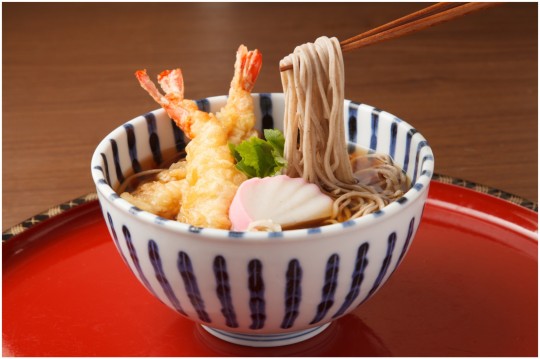
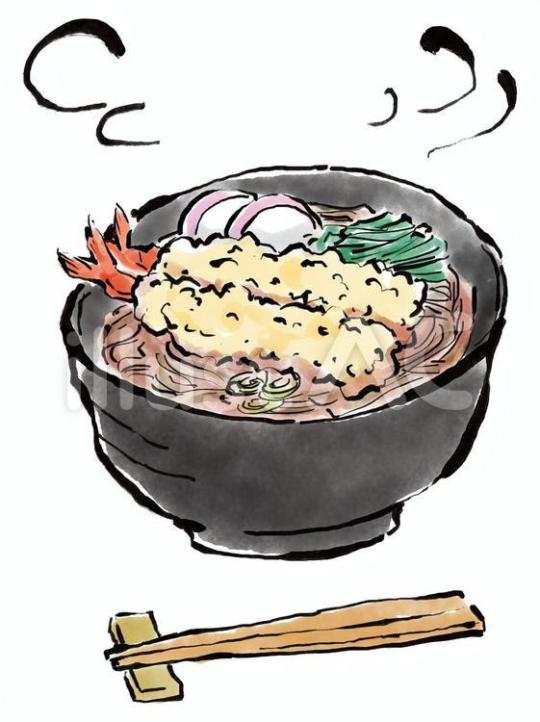
Sean bienvenidos a la última publicación del año hoy dia 31/12/2021 se come Toshikoshi soba, para despedir el año ¿Cuándo surgió ?y ¿por qué?. _ Ya durante el siglo V ya era bastante popular , se ha comido de formas distintas proviene del trigo sarraceno, se comía tal cual o se mezclaba con agua y luego se cocinaba lo más probable es que fuera introducido por china a través de Corea . - ¿Cómo se llamaba al plato popular del siglo V? soba-gaki y para beber soba-yu( este era más popular en el periodo edo para las enfermedades). El trigo sarraceno se hacía como unas albóndigas que después se comen hervidas, ¿Posible comida para ricos?. La soba como la conocemos data del periodo Edo hasta nuestros días siglo 16 año 1574 aproximadamente. - ¿Combinación con la temperatura? Se hizo popular por la misma época mencionada anteriormente, la soba tiene vitamina B1. - ¿Cocían este plato o su historia? espero que se lo pasen bien en la noche de nochevieja un cordial saludo. -
今日の最後の出版物へようこそ2021年12月31日大晦しそばが食べられて、今年に別れを告げます。それはいつ起こったのですか?そしてなぜですか? すでにV世紀の間にそれはすでに非常に人気があり、それはさまざまな方法で食べられました、それはそばから来ます、それはそのまま食べられるか、水と混合されてから調理されました、それは韓国を通して中国によって導入された可能性が高いです。 5世紀の人気料理は何と呼ばれていましたか? そばがきとそば湯を飲む(江戸時代は病気で人気がありました)。 そばはミートボールのように作られ、後で茹でて食べられます。 ご存知のそばは江戸時代から現在の16世紀、1574年頃までさかのぼります。 温度との組み合わせ? 上記と同時期に人気を博し、そばにはビタミンB1が含まれています。 彼らはこの料理またはその歴史を調理しましたか? 大晦日、心からのご挨拶をお楽しみください。 -
Welcome to the last publication of the year today 12/31/2021 Toshikoshi soba is eaten, to say goodbye to the year. When did it arise? And why ?. Already during the V century it was already quite popular, it has been eaten in different ways, it comes from buckwheat, it was eaten as it is or mixed with water and then cooked, it is most likely that it was introduced by China through Korea. What was the popular dish of the 5th century called? soba-gaki and to drink soba-yu (this was more popular in the Edo period for illnesses). Buckwheat was made like meatballs that are later eaten boiled. Possible food for the rich? Soba as we know it dates from the Edo period to the present day 16th century, approximately 1574. Combination with temperature? It became popular around the same time mentioned above, soba has vitamin B1. Did they cook this dish or its history? I hope you have a good time on New Years Eve, a cordial greeting.
51 notes
·
View notes
Text
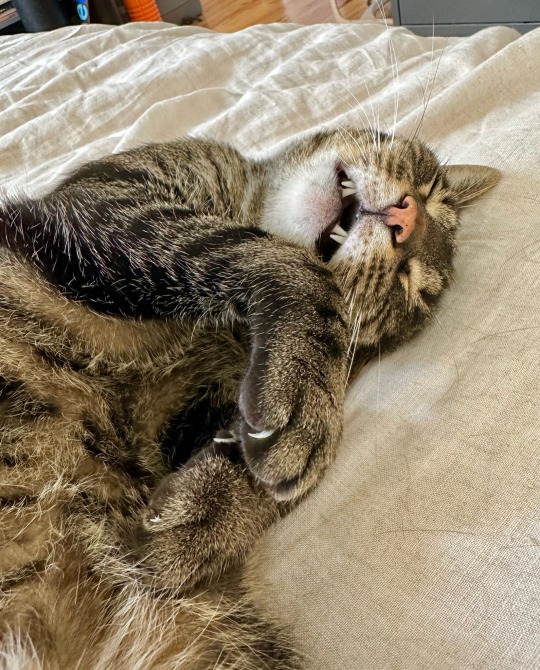
てか、ここ7-8ヶ月間仕事が忙しすぎて、全くYouTubeチャンネルチェックしてなかったけど、見たらもうすぐ登録者数1000人!?
また撮影し始めたいよー!😆
チャンネル登録まだな方は是非遊びに来てみて下さーい!🎶💕
I just logged in to my YouTube channel…I’ve been so busy working for the past 7-8 months and wasn’t paying attention so much…but I can’t believe it’s almost 1000 subscribers!!!!
This makes me want to start shooting video again!! 🐾🎥
100 notes
·
View notes
Text
Phighting Incorrect Quotes
Skateboard: Will you date me? Breathe if yes, and recite the Bible in Japanese if no.
Slingshot: 初めに、神は天と地を創造されました。
Skateboard: WHAT THE!?
Slingshot: 地球は形もなく虚無であり、暗闇が深海の面を覆いました…
Skateboard: IS THAT ACTUALLY THE BIBLE!?
Slingshot: …そして神の霊が水面の上に浮かんでいました。
Skateboard: AND YOU STOPPED BREATHING TOO!?
Slingshot: そして神は「光あれ」と言われました。
Skateboard: Christ, it would have been preferable for you to just beat me up and call me gay.
--------------
Banland Cook: What do you want for breakfast?
Void Star: I WISH TO DEVOUR THE UNBORN.
Banhammer:
Banhammer: They want eggs.
----------------
Slingshot: Welcome to phucking Apple Bees. What can we serve you?
Sword: Bees?
Slingshot: THEY HAVE SELECTED THE BEES.
Sword: Wait-
(Shuriken approaches, shaking a jar of bees menacingly)
---------------
Subspace: I can't believe all these people are wearing black. Black is supposed to be my thing, they're all just posers.
Medkit: Subspace for the last time, we're at a funeral.
21 notes
·
View notes
Text
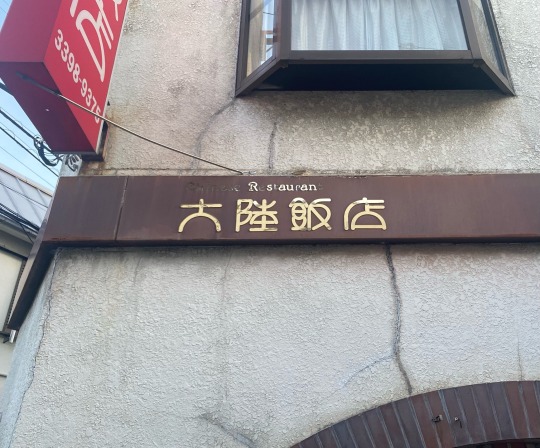

Today, a Chinese restaurant because I LOVE THIS TYPEFACE! So roundy. Not sure which sign I like more so I put both.
大陸 【たいりく】 means continent. Here it refers to continental China.
大 means big or large. It's read おお-, おお.きい, -おお.いに, ダイ, or タイ.
陸 means land. It's also an alternative way to write 六 six. It's read おか, リク, or ロク.
飯店 【はんてん】 means Chinese restaurant.
飯 means (cooked) rice or meal/food. It’s read めし or ハン.
店 means store or shop. It's read みせ, たな, or テン.
I should mention that 飯店 isn't a generic term; you mostly see it in names of Chinese restaurants. You're more likely to hear 中華(料理) 【ちゅうか(りょうり)】 Chinese food or 中華料理屋(さん) 【ちゅうかりょうりや(さん)】 Chinese restaurant.
Also, let's talk about 中華 【ちゅうか】, literally, "middle" + "flower." It's technically a pretty name for China, but in practice, it tends to mean Chinese food or Chinese restaurant. Just ask Google Images:

So why 中華 and not 中国 【ちゅうごく】? Well, you can say 中国料理, usually to refer to Chinese food the way it's made in China. By contrast, 中華料理 implies that it's adapted for Japanese tastes. But my feeling (grain of salt) is that 中華料理 is used colloquially across the board, to the extent that if you hear a non-native speaker say 中国料理, you'd probably assume that it's a mistake, not that they're trying to be specific.
It's also my experience that a Chinese place that wants to advertise its authenticity is more likely to label itself more specifically and use the name of a region. Which is especially understandable when you consider the huge diversity of Chinese cuisine, but that's probably part of the reason I don't see 中国料理 used that often.
23 notes
·
View notes
Text
食材の多い料理店
The Restaurant of Many Ingredients (Much Meat)
全身白髪だらけだと
As he strokes his red crest,
赤いとさかを撫でながら
Fry Kitchen grumbles that he's covered
フライ・キッチンがぼやく
Head to toe in white hairs
石臼での粉挽きなど
This is the first time in his life
生まれて初めて 昔は
That he's ever ground flour with a stone mortar
そんな身分じゃなかった
This hadn't been his standing in life in the past
.
屍用人に身を落としても
Though he'd stooped to the position of undead servant
家畜の姿に変わっても
Though his form had changed to that of livestock
意外と気分は悪くない
It actually isn't all that bad
今になって気がついたのさ
It was now that he realized
机に積まれた札束など
That stacks of money piled up on a desk
何の意味も無かったんだと
Don't really mean anything
.
肉の焦げた匂いが漂う
The smell of charred meat wafts through the air
次は自分じゃない事を祈る
He prays that he isn't next
.
ずっとうんざりしてたのさ
He'd always been so bored and fed up
23人の兄弟ども
So he finally bid farewell
ようやく別れを告げて
To his 23 siblings
ポーク・チョップは独立した
Pork Chop had set out on his own
嬉しい事のはずなのに
This should have been a happy thing
何故だか少し寂しい
But somehow it was a little lonesome
.
鼻を鳴らして野菜を切る
He cuts vegetables while snuffling and snorting
刃物の扱いは慣れたものさ
He's gotten used to holding a knife
何人も刻んできたから
Since he's chopped up countless people
希代の始末屋だったのに
He'd once been uncommonly stingy
今じゃのろまの���兄弟にさえも
But nowadays he can't even hold a candle
頭があがりゃしないのさ
To those blockhead cousins of his
.
熊の瞳がこっちを見ている
The bear's eyes are looking his way
獲物が自分じゃない事を祈る
He prays that he's not its prey
.
憧れのあの方にならば
Chateau Briand had declared that
食べられても構いませんわ
As long as it was by the one he admired
シャトー・ブリアンは言い切った
He wouldn't mind being eaten
あの日話しかけられなくて
He hadn't been able to speak to them that day
助ける事が出来なかった
And so couldn't save them
後悔は今も残る
His regrets linger even now
.
16人目のコックになる
He'd become the 16th cook
決意して門をたたいたけど
Though he had mustered his will and applied for an apprenticeship
既に屋敷はもぬけの殻
The mansion was already an empty husk
今ではもうあの時とは
And now everything
全てが変わってしまったけど
Is different from the way things were then
変わらないものだってあるの
Yet there are some things that haven't changed
.
けだるげな赤猫をみかける
He spies a listless looking red cat
自分のお腹の肉をなでる
It pats the meat of his belly
.
たどたどしい手つきの料理
I wordlessly gaze upon
行う弟子たちの姿を
The sight of my pupils
俺は無言で眺める
Carrying out their clumsy cooking technique
昔のことなど忘れた
I've forgotten most of my past
それでもこの調理場には
Even so, this kitchen
懐かしい匂いがする
Has a scent that brings back memories
.
誰かと旅をし料理をする
To go traveling with someone, and make food with them,
それがかつて自分が望んだ
Wasn't that the life that I had once
生活だったのだろうか
Wished to have?
店をにぎわす異界の客
These guests from the parallel world bustling through the restaurant,
彼らのために用意された
I reach for the new ingredient
新たな食材を手に取る
That I've prepared for them
.
幸せの花は赤く綺麗で
The flower of happiness is a lovely red
メインディッシュのスパイスに最適
It'll be a perfect spice for the main dish
.
再び弟子たちに目をやる
Again he looks towards his apprentices
選ばなければならない
He'll have to select
メインディッシュの食材を
The main ingredient for the main dish
不足で困る事は無い
He isn't lacking in choice
ここはとても食材の多い
This is Mister Dog's restaurant
ミスター・ドッグの料理店
Of many ingredients
29 notes
·
View notes
Photo

✿ 野菜と春雨のしょうがレモンスープ ✍️ 汁なし副菜→きのこ,ながいも,ハム,バター,白ワイン,鶏がら小1,マスタード,ごま
#cook:汁物#cook:しょうが#cook:生姜×鶏がら×レモン汁#cook:汁物:鶏がら#cook:汁なし副菜#cook:春雨#cook:生姜×鶏がら×バター×レモン汁#cook:生姜×粒マスタード×鶏がら×レモン汁#cook:生姜×粒マスタード×鶏がら×バター×レモン汁#cook:2020〜#2020〜#cook#cook:はくさい
0 notes
Text

こふく:通称こふ、こふちゃん、稀にこふたん、こふたろう、こふくさん、別名脅威の黒猫
2022年7月、約2ヶ月半で保護施設から引き取られた。脱肛しており長くないかもと言われていたが、無事改善しすくすく育つ。
Jさんに日々挑みかかる強気な幼少期を送るも実は怖がりで、たまのお客さんはおろかじいちゃんにすら挨拶したことがない内弁慶。
だっこを嫌い、呼べば逃げ、最近は何を考えているか分からない顔で床に落ちており、家主ですら意思疎通は困難。しかし朝家主が目覚めると枕シェアによる寄り添いサービスを行っており、一定の愛情はあるもよう。
米をこよなく愛し、炊きたてご飯や準備中の餅米をむしゃむしゃと食べる。また物理的に我が道を行くため多くの物を壊し、実はかなり家主に散財させている。
Kofuku: known as Kofu, Kofu-chan, rarely Kofutan, Kofutaro,or Kofuku-san, and the alias is the black menace
He was adopted from the animal shelter when he was around 2months and a half. Although it was said he might not live so long because he had the anal prolapse, now he has no problems and has gotten so big.
He had a violent childhood attacking Mr.J every day, but his nature is only a home tiger so he can't greet with not only her guests but grandpa yet.
He hates being hugged, runs away when she calls him, and falls on the floor with the face that doesn't know what he's thinking these days, so it's still impossible for landlady to communicate with him. She can feel his affection only by his staying beside service with sharing her pillow when she wakes up.
He loves rice SO much and eats cooked rice or prepared mochi rice. And he always goes his way physically,then broke a lot of things at home so he let her spend quite an extra money...
5K notes
·
View notes
Text


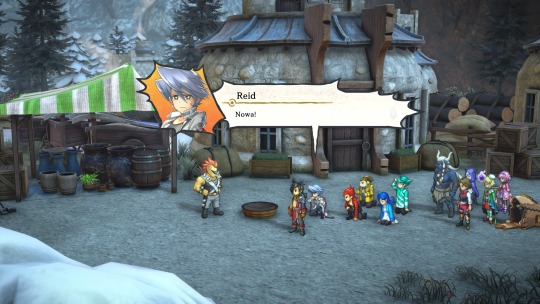
Gosh Beigoma & cooking battles took forever. ✒️ notes along the way. 112 heroes recruited so far!
Have you completed the game? #Eiyuden

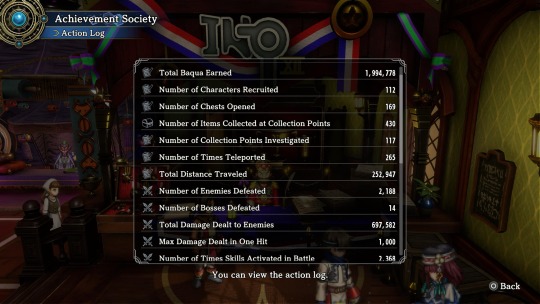
112人仲間入り!後もうちょいかな〜
ベーゴマと料理大変だった😵💫but沢山研究して楽しい🤓✒️
クリアした方いるかな?

🚩降ろさな〜い♪ #百英雄伝
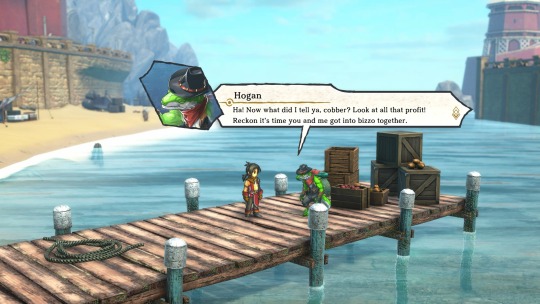
Also, they had to call the gator Hogan hehe🇦🇺 bizzo w
I may have taught English on NHk (Japanese TV).
I think the #EiyudenChronicle translation team did an awesome job🇦🇺
Bizzo/Arvo/Servo
We like our Os at the end.
‘Reckon’ I didn’t realise I used so often until a French person pointed it out.
So what d’ya reckon? #Aussie
オージー英語🇦🇺 #百英雄伝
オージー英語なのながウケるw
色々なSNSで『これのどこがオージー英語なの?』
という問いがあったので、こちらにサラッと答えます。
まず「bizzo」 は「business」のこと。
オージー英語ではよく語尾に「o」をつけます。
例. Arvo —> afternoon
例. Servo —> service station
‘What did I tell ya?’
この「ya」も非常に良く使う。
(ゲーム、文字は英語に設定していて、ナレーションは日本語の声優さんにしているので、これ読むだけでオージーのイントネーションが伝わって来る!!)
最後に「Reckon」。
これは、英語がネイティブでないヨーロッパの人に、『サラ良く使うね』、と言われてから気づき、他のオージーに聴いたら、確かにそうかもねとの結論。
#百英雄伝 の通訳者、非常にリサーチされてます!💪
言うまでもなく、ワニのキャラにこの表現と名前も🇦🇺
サラッとオージー英語、でした🤓
#サラ・オレイン#sarah àlainn#sarah alainn#サラオレイン#vgm#Eiyuden#eiyuden chronicle#百英雄伝#ベーゴマ#料理バトル#beigoma#cooking battle#サラッと英語#オージー#オージー英語#Aussie#Aussie slang#Aussie English#Australia#オーストラリア#オーストラリア英語
28 notes
·
View notes
Text
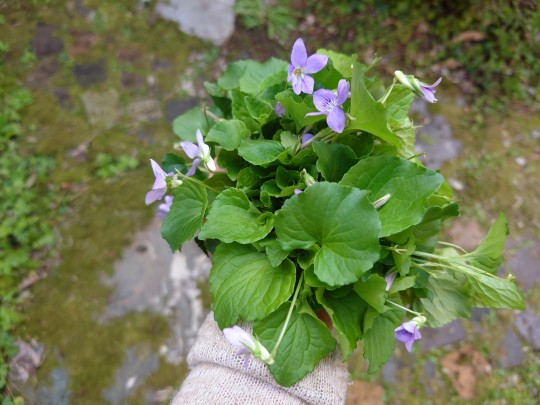
我が家には、けっこうな量のスミレが生えています。その昔、種が飛ぶ頃転げ回っていた、白っぽい猫のせいです。
木の下なんかの、そんなに固くなさそうなところを摘んで…
There are quite numbers of violets in my garden because a whity cat was running and rolling around before when they had seeds ...
Today I picked up some softer ones from sunshade...
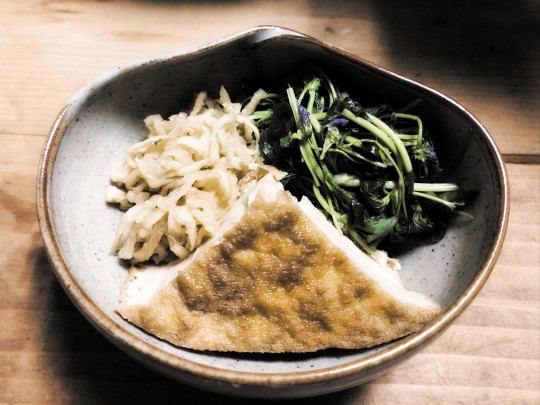
夕ご飯!厚揚げと切り干しとスミレの煮浸し!
and cooked my dinner!
258 notes
·
View notes
Text
地元の市場に行くと、その土地の食が見えてきます。沖縄の那覇市にある公設市場。魚介類や肉類などが売られています。2階にはそこで購入した魚介類を調理してくれる店舗もあって楽しめます。新鮮な魚、塩焼きや煮付け、刺身で最高!写真は無料でダウンロードできるようにしていますので自由に利用してください。
"When you visit a local market, you get a glimpse of the local cuisine. The Public Market in Naha City, Okinawa, sells seafood, meat, and more. On the second floor, there are shops that will cook the seafood you buy, making for a great experience. Fresh fish, grilled with salt, simmered, or as sashimi—it's the best! The photos are available for free download, so feel free to use them."
27 notes
·
View notes